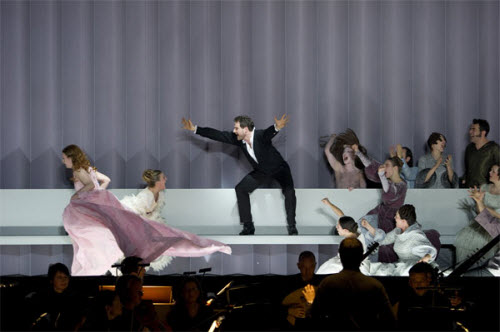 Germany Purcell: Dido and Aeneas, Bartók: Bluebeard’s Castle: Frankfurter Opern und Museumsorchester, Chor der Oper Frankfurt, Steven Sloane (conductor), Opernhaus Frankfurt, 8.6.2013 (JMI)
Germany Purcell: Dido and Aeneas, Bartók: Bluebeard’s Castle: Frankfurter Opern und Museumsorchester, Chor der Oper Frankfurt, Steven Sloane (conductor), Opernhaus Frankfurt, 8.6.2013 (JMI)
Production: Oper Frankfurt
Direction: Barrie Kosky (original)
Ute M. Engelhardt (revival)
Sets and costumes: Katrin Lea Tag
Lighting: Joachim Klein
Casts:
Dido and Aeneas
Dido: Sharon Carty
Aeneas: Sebastian Geyer
Belinda: Kateryna Kasper
Sorceress: Martin Wölfel
First Witch: Dmitry Egorov
Second Witch: Roland Schneider
Second Woman: Elizabeth Reiter
Spirit/Sailor: Peter Marsh
Bluebeard’s Castle
Bluebeard: Simon Bailey
Judit: Michaela Schuster

Photo (c) Monika Rittershaus
In recent years it has become more and more common to analyze double bills in terms of the consistency of the two works. I have never shared this interest because what really matters for me is whether the two operas are of high enough quality in and of themselves.
In Frankfurt we heard two operas that have nothing in common, not plot, nor style, nor time of composition, and their orchestral demands could not be more different. But, to quote Galileo, è pur si muove. The quality of both operas made it work out.
The double bill began with Henry Purcell’s opera which premiered in 1689. I confess that the more I see this opera, the more it is a surprise to me. Purcell is a true musical genius, and it is incredible that he could make such fresh music, so inspired and – why not – so modern for the 17th century.
The second opera was this masterpiece by Béla Bartók. It is not such a rarity anymore, and is appearing more and more frequently in the programs of our opera houses. There are good reasons for this. It is an opera that is not very expensive to cast, although it is very demanding for the orchestra. Its merit is unquestionable. Whoever hears it for the first time will never forget the impact of the music that Bartók wrote for the opening of the fifth door.

Barrie Kosky’s production placed Purcell’s opera in a narrow space at the front of the stage with only a long banquette as set. The costumes corresponded to the time of the opera’s composition and were attractive, in warm colors for the choir and black for Aeneas and the witches. Kosky did a great job of stage direction within this narrow space. The only part I did not like was having Queen Dido on stage sonorously crying after singing the wonderful “Dido’s Lament,” while the orchestra and chorus concluded the opera.
For the Bartók, Kosky offered a bare stage with a round platform, rotating and inclined, and black curtains: minimalism at its best. From the various “doors” came mute characters, dressed exactly like Bluebeard and Judith. There were no doors literally, but elements that referred to what Judith sees when the doors are open. Sometimes these elements were provided by extras, and other times they were taken from Bluebeard’s body. In the impressive sixth door, the lake of tears, the extras got a real shower with the water coming out from their own bodies. It was a beautiful and impressive scene. You cannot do more with less, and Mr. Kosky is a great director.
I enjoyed Steven Sloane’s conducting in both operas, but it was particularly shining in Bartók’s. His conducting was more delicate in Dido, which the excellent orchestra played on period instruments.
Irish mezzo soprano Sharon Carty was Queen Dido. She has an attractive voice, somewhat small in size, but she sang with gusto. She looks promising, although she is perhaps still somewhat immature for a character like this. Sebastian Geyer was well suited to Aeneas, but maybe a little coarse. Kateryna Kasper as Belinda has an appealing voice. The three Witches were very funny, especially countertenor Martin Wölfel.
Simon Bailey was a convincing Bluebeard on stage, but his middle range is too light for the character. Michaela Schuster was very good as Judith, with a convincing voice, powerful and musical.
José Mª. Irurzun